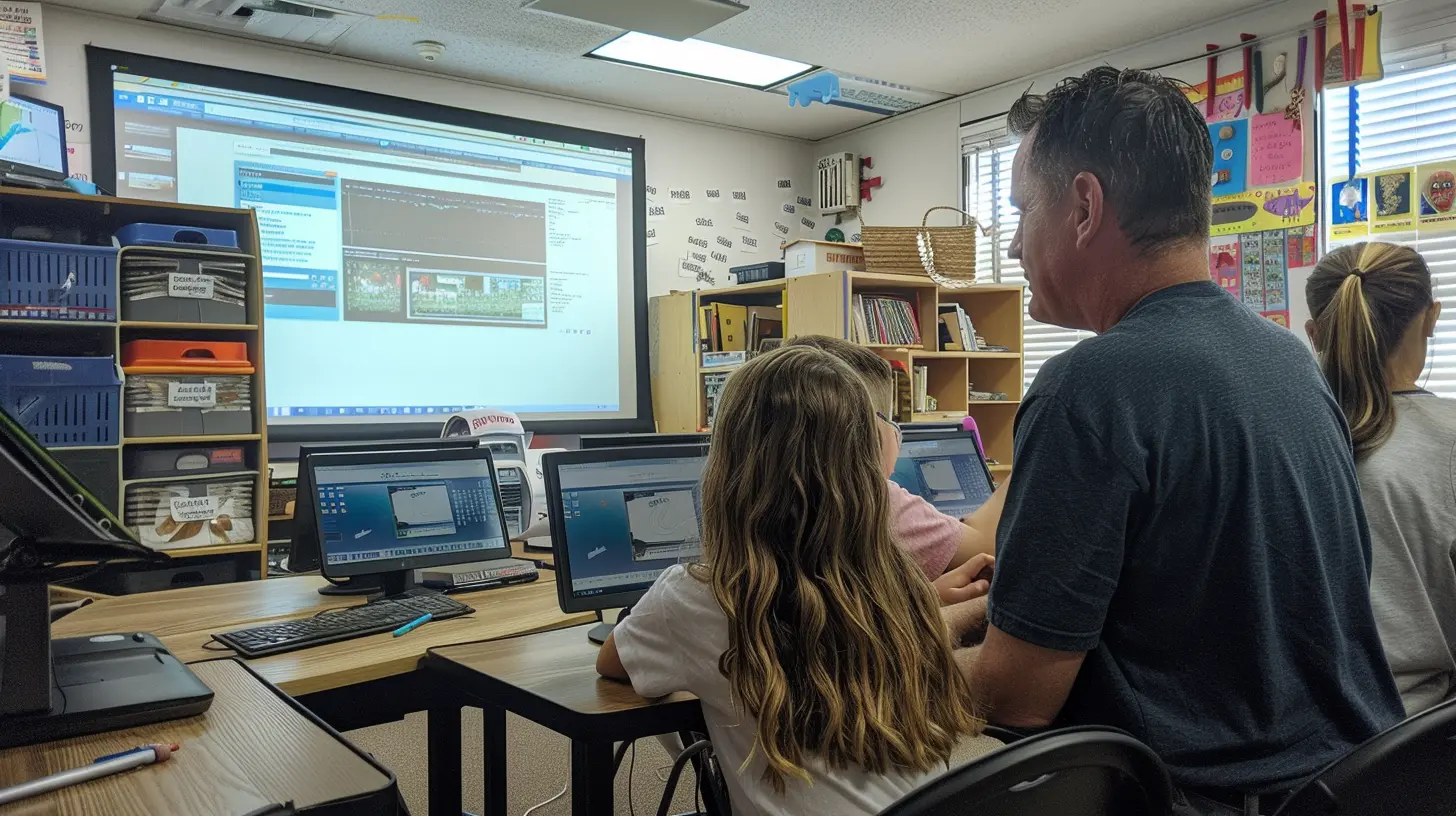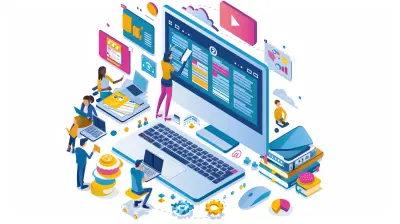Engaging Students with Digital Formative Assessment Tools
13 March 2025
In today’s fast-paced digital world, education is constantly evolving. Traditional classroom methods are being complemented (or even replaced) by innovative digital tools. One area of education that has seen a significant transformation is assessment – and more specifically, formative assessment. If you’re wondering how you can keep students engaged while assessing their learning journey, the answer might just lie in digital formative assessment tools.
But, what exactly are these tools? And how can they help you keep students motivated and on track? Stick around, because that’s exactly what we're diving into!

What Are Digital Formative Assessment Tools?
Let’s start with the basics. Formative assessments are ongoing checks for understanding that happen during the learning process. Unlike summative assessments (think final exams or end-of-term projects), formative assessments are low-stakes and are meant to give both the teacher and the student insights into the student’s progress.Now, when we throw the word "digital" into the mix, we’re talking about using online platforms, apps, and software to carry out these assessments. These tools help to collect real-time data on student learning, making it easier for teachers to adjust their instruction and for students to self-reflect on their progress.
So, why go digital with formative assessments? The short answer: they’re engaging, interactive, and often more efficient. Plus, they offer a variety of formats – from quizzes and polls to interactive games and collaborative activities.
Let’s explore how these tools can truly engage students and enhance their learning experience.

Why Digital Formative Assessment Tools Are a Game-Changer
1. Instant Feedback
One of the most significant advantages of digital tools is the ability to provide instant feedback. Gone are the days when students had to wait for days (or sometimes weeks!) to receive feedback on their work. With digital formative assessments, students can know right away where they stand.Imagine being able to correct mistakes and adjust your learning in real-time. That’s exactly what students experience with tools like Google Forms or Kahoot!. Instant feedback helps students identify gaps in their understanding and encourages them to take immediate action.
Example: If a student answers a question incorrectly on an online quiz, they might get an immediate explanation of why their answer was wrong, and even a suggestion for additional resources to help them understand the concept better.
2. Increased Engagement Through Gamification
Who says learning can’t be fun? Many digital formative assessment tools incorporate gamification elements, turning what might otherwise be a boring quiz into an exciting, competitive experience. Tools like Kahoot!, Quizizz, and Classcraft allow teachers to create games and challenges that students can participate in, either individually or as teams.What’s great about gamification is that it taps into students' natural love for competition and rewards. Whether it’s earning points, badges, or climbing a leaderboard, these small elements can make a big difference in student motivation. When students see learning as a game, they’re more likely to stay engaged and put in the effort.
Fun fact: Research shows that gamification can increase student engagement by up to 50%! It’s a no-brainer for keeping students involved in their learning.
3. Differentiated Learning Opportunities
Every student learns differently, and the one-size-fits-all approach to education doesn’t work for everyone. Digital formative assessment tools allow for differentiation, meaning you can tailor assessments to meet individual students' needs.Tools like Nearpod and Edpuzzle enable teachers to create personalized learning paths. You can assign different activities based on a student’s performance or even allow students to choose their own learning path. This flexibility ensures that every learner is challenged at their own level.
Think about it: A student who’s struggling with a concept may need extra practice, while another might be ready to move on to a more advanced topic. By using digital tools, you can cater to both students without leaving anyone behind.
4. Enhanced Collaboration
Formative assessment doesn’t have to be a solo activity. Many digital tools encourage collaboration and group work, which can help students develop essential teamwork skills. Tools like Padlet and Flipgrid allow students to share ideas, respond to each other’s work, and provide peer feedback.These platforms foster a sense of community and open up opportunities for dialogue. When students work together, they can learn from each other, discuss different viewpoints, and build on each other’s ideas. Collaboration also makes learning more social, which can be especially important for students who thrive in interactive environments.
5. Data-Driven Instruction
One of the most powerful aspects of digital formative assessment tools is the ability to collect and analyze data in real-time. Tools like Socrative and Google Classroom provide teachers with detailed reports on student performance. You can track trends, identify areas where students are struggling, and adjust your instruction accordingly.This data-driven approach allows for more targeted teaching. Instead of guessing where your students are at, you have concrete data to guide your decisions. For example, if you notice that a large portion of the class is struggling with a particular concept, you can spend more time reviewing it or offer additional resources.
At the same time, students can view their own progress, which helps them take ownership of their learning. When students see the data, they’re more likely to set goals and work toward improvement.

Popular Digital Formative Assessment Tools (And How to Use Them)
There are tons of digital formative assessment tools out there, but here are some of the most popular ones and how you can use them to engage your students:1. Kahoot!
Kahoot! is an interactive quiz platform that turns assessments into fun, competitive games. Teachers create quizzes, and students can participate using their devices. Kahoot! is great for quick checks for understanding and review sessions.How to use it: Create a fun quiz with multiple-choice questions and let students compete in real-time. Add images, videos, or diagrams to make it more visually engaging.
2. Padlet
Padlet is a virtual bulletin board where students can post their thoughts, ideas, or responses to questions. It’s perfect for collaborative learning and sharing resources.How to use it: Pose an open-ended question or topic and ask students to post their reflections. Encourage them to comment on each other’s posts to foster discussion.
3. Quizizz
Similar to Kahoot!, Quizizz is another gamified quiz platform. However, Quizizz allows for both live games and homework assignments. Students can complete quizzes at their own pace, and teachers get detailed reports on student performance.How to use it: Assign quizzes as homework, and use the data to identify areas where students need additional support.
4. Socrative
Socrative is a student-response system that lets teachers create quizzes, polls, and exit tickets. It provides real-time feedback and detailed reports, making it easy to track student progress.How to use it: Use Socrative for quick checks at the beginning or end of a lesson. For example, you can create a short exit ticket to see what students understood and what they’re still struggling with.
5. Nearpod
Nearpod is an all-in-one platform that allows teachers to create interactive lessons with quizzes, polls, virtual field trips, and more. It’s great for blended learning and can be used in both in-person and online classrooms.How to use it: Create interactive lessons with embedded formative assessments, such as polls or quizzes. You can also use Nearpod’s virtual field trips to engage students with immersive learning experiences.

Best Practices for Using Digital Formative Assessment Tools
Now that we’ve covered why digital formative assessment tools are so beneficial, let’s talk about some best practices to ensure you’re using them effectively:1. Start Small
If you’re new to digital formative assessments, don’t feel like you need to dive in headfirst. Start with one tool and integrate it into your lesson plans. Once you and your students feel comfortable, you can start exploring more options.2. Keep It Low-Stakes
Remember, formative assessments are meant to guide learning – they’re not about giving grades. Make sure students understand that these assessments are designed to help them, not to penalize them.3. Mix It Up
Variety is the spice of life! Don’t rely on just one tool or format. Mix things up with quizzes, polls, collaborative activities, and interactive lessons. By keeping things fresh, you’ll maintain student engagement.4. Use Data to Inform Instruction
One of the biggest advantages of digital tools is the data they provide. Use this data to inform your instruction and provide targeted support to students who need it.5. Involve Students in the Process
Give students a say in their learning! Let them choose which digital tools they prefer or allow them to create their own quizzes or interactive activities. This can increase their investment in the learning process.Conclusion
Incorporating digital formative assessment tools into your teaching can completely transform the way you engage with your students. From instant feedback and gamified experiences to personalized learning and collaborative opportunities, these tools offer a dynamic and flexible approach to assessment. By taking advantage of the wide range of digital tools available, you can create a more interactive and engaging learning environment that not only keeps students motivated but also helps them take ownership of their educational journey.So, the next time you’re planning your lessons, why not try incorporating some digital formative assessments? Your students will thank you – and you’ll likely see a significant improvement in both engagement and performance.
all images in this post were generated using AI tools
Category:
Formative AssessmentAuthor:

Zoe McKay
Discussion
rate this article
17 comments
Mateo McMichael
Who knew assessments could be as fun as a cat wearing a lab coat? Let's sprinkle some digital magic into learning! Time to level up engagement with tools that make feedback feel like a game!
April 3, 2025 at 11:43 AM

Zoe McKay
Absolutely! By incorporating playful elements, we can transform assessments into enjoyable experiences that boost student engagement and learning. Let’s keep that digital magic flowing!
Matteo McDonough
Digital formative assessment tools empower educators to unlock student potential, fostering engagement and enhancing learning. Embrace these innovative resources to create dynamic classrooms where every student thrives and discovers their unique strengths!
April 1, 2025 at 11:46 AM

Zoe McKay
Thank you for your insightful comment! I completely agree that digital formative assessment tools are key to fostering engagement and enabling students to realize their full potential. Embracing these resources truly transforms the classroom experience.
Lindsey McKeehan
Great insights on using digital tools! Engaging students is crucial for learning.
March 31, 2025 at 7:11 PM

Zoe McKay
Thank you! I'm glad you found the insights valuable. Engaging students is indeed key to effective learning!
Derek McIntyre
Digital tools: engagement redefined in formative assessment!
March 31, 2025 at 11:17 AM

Zoe McKay
Thank you for your engagement! Digital tools indeed transform formative assessment by enhancing interactivity and providing real-time feedback for students.
Delta Carrillo
Digital formative assessments: because even quizzes deserve a glow-up! Time to make learning sparkle!
March 28, 2025 at 11:46 AM

Zoe McKay
Absolutely! Digital formative assessments can transform traditional quizzes into interactive and engaging experiences that truly enhance learning. Let's make education shine!
Jack Walker
Great insights on utilizing digital formative assessment tools! Engaging students through interactive platforms can enhance understanding and motivation. It would be helpful to include examples of specific tools that have proven effective in diverse classroom settings.
March 27, 2025 at 3:50 AM

Zoe McKay
Thank you for your feedback! I appreciate your suggestion and will consider including specific examples of effective tools in future discussions.
Jessamine Robinson
Digital formative assessment tools not only gauge learning but also empower students, fostering a culture of reflection, growth, and collaboration.
March 26, 2025 at 1:23 PM

Zoe McKay
Thank you for your insightful comment! I completely agree—digital formative assessment tools indeed promote reflection, growth, and collaboration, enhancing the overall learning experience.
Jemima Taylor
This article effectively highlights the importance of digital formative assessment tools in fostering student engagement. Incorporating technology not only enhances learning but also provides instant feedback for continuous improvement.
March 23, 2025 at 5:25 AM

Zoe McKay
Thank you for your insightful comment! I'm glad you found the article highlights the critical role of technology in enhancing student engagement and providing timely feedback.
Ella McKittrick
Digital tools are cool, but remember: if your students aren’t engaged, you might just be throwing pixels at a wall!
March 22, 2025 at 11:33 AM

Zoe McKay
Absolutely! Engagement is key; digital tools should enhance interaction, not replace it. Let's focus on strategies to keep students actively involved!
Cody Barlow
Digital formative assessment tools not only enhance engagement but also foster a culture of continuous learning, prompting students to become active participants in their educational journey rather than passive recipients.
March 21, 2025 at 9:36 PM

Zoe McKay
Thank you for highlighting the importance of digital formative assessment tools! They truly empower students to take an active role in their learning, enhancing engagement and promoting a culture of continuous improvement.
Kira Soto
Great insights on using digital formative assessment tools! It's exciting to see how technology can enhance student engagement and learning. These strategies are sure to inspire educators to create more interactive and effective classroom experiences. Looking forward to implementing these ideas!
March 20, 2025 at 7:27 PM

Zoe McKay
Thank you for your kind words! I'm glad you found the insights helpful and inspiring. Excited to see how you implement these strategies in your classroom!
Seraphis McCaw
Great article! It's exciting to see how digital formative assessment tools can really transform student engagement. Implementing these strategies can make learning more interactive and fun. I'm looking forward to trying some of these ideas in my classroom!
March 19, 2025 at 8:59 PM

Zoe McKay
Thank you! I'm glad you found the article helpful and inspiring. Best of luck implementing the strategies in your classroom!
Remington White
This article highlights the transformative potential of digital formative assessment tools in education. By fostering engagement and providing immediate feedback, these tools not only enhance learning but also empower students to take ownership of their progress. Excellent insights!
March 18, 2025 at 8:31 PM

Zoe McKay
Thank you for your feedback! I'm glad you found the insights on engagement and student empowerment valuable.
Bailey Newton
Transform your classroom experience! Digital formative assessment tools empower educators to connect with students, spark curiosity, and foster a love for learning. Embrace the digital revolution!
March 18, 2025 at 12:19 PM

Zoe McKay
Thank you for your enthusiasm! Digital formative assessment tools truly enhance engagement and foster meaningful connections in the learning process.
Elora Pope
Digital formative assessment tools aren't just a trend; they're essential. Embrace the change, challenge the status quo, and elevate student engagement. It's time to leave outdated methods behind and revolutionize how we assess and inspire learning!
March 18, 2025 at 4:02 AM

Zoe McKay
Thank you for your insightful comment! I completely agree—embracing digital formative assessment tools is crucial for enhancing student engagement and transforming our learning environments. Let's continue to innovate!
Andrew Ramos
Oh, sure! Because nothing says “I care about your learning” like turning a classroom into a tech support hotline. Can’t wait to see how we’ll engage students by making them troubleshoot their own devices! Fun times ahead!
March 17, 2025 at 1:07 PM

Zoe McKay
I appreciate your perspective! The goal is to empower students with tech skills while enhancing their learning experience, not to create frustration. Balancing support and engagement is key!
Indigo McQuaid
Digital tools enhance engagement and learning outcomes.
March 15, 2025 at 9:41 PM

Zoe McKay
Absolutely! Digital tools not only boost engagement but also significantly improve learning outcomes by providing immediate feedback and fostering interactive learning experiences.
MORE POSTS

Collaborative Learning: Engaging Parents and Children Together

Setting Realistic Expectations for Your Child’s Academic Progress

Using Rubrics for Consistent and Transparent Formative Feedback

How to Leverage Video Conferencing Tools for Remote Learning

The Importance of Networking While Studying Overseas

Using Transitional Phrases to Improve Writing Flow

How to Prepare for Climate Differences When Studying Abroad

How to Fund Your Study Abroad Experience Without Breaking the Bank

The Ultimate Guide to Choosing the Perfect Study Abroad Destination

Creating a Personal Learning Plan for Online Success

Navigating Cross-Generational Communication in the Workplace